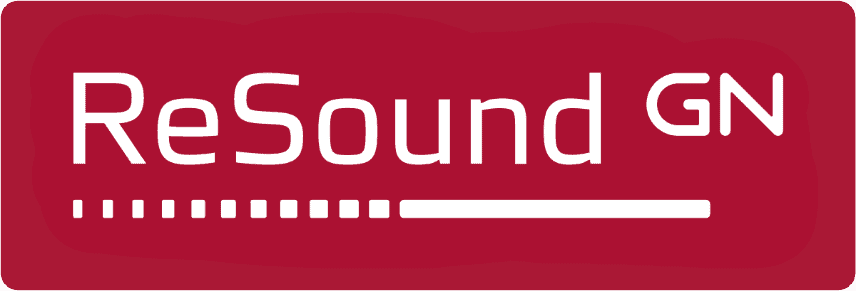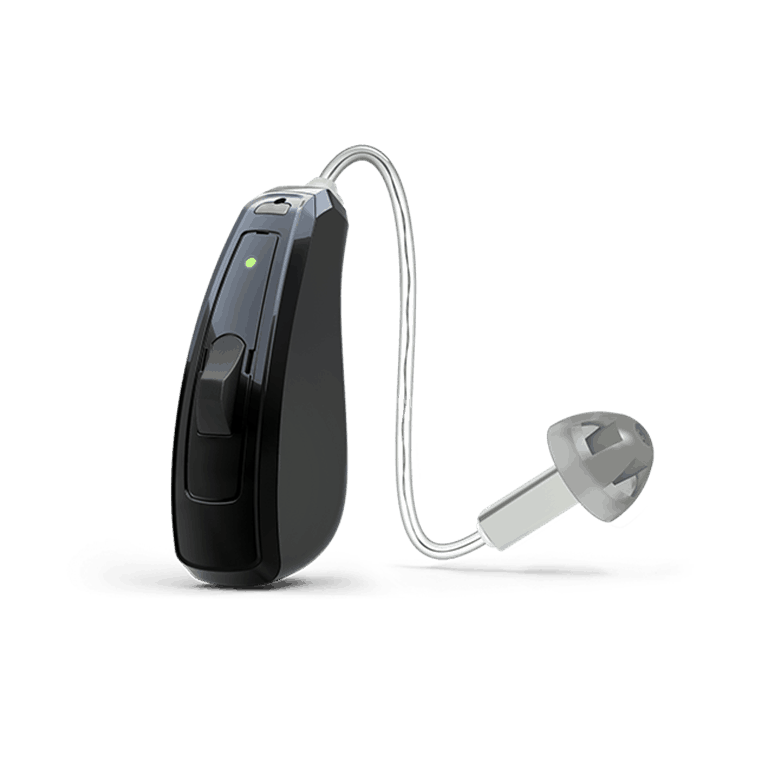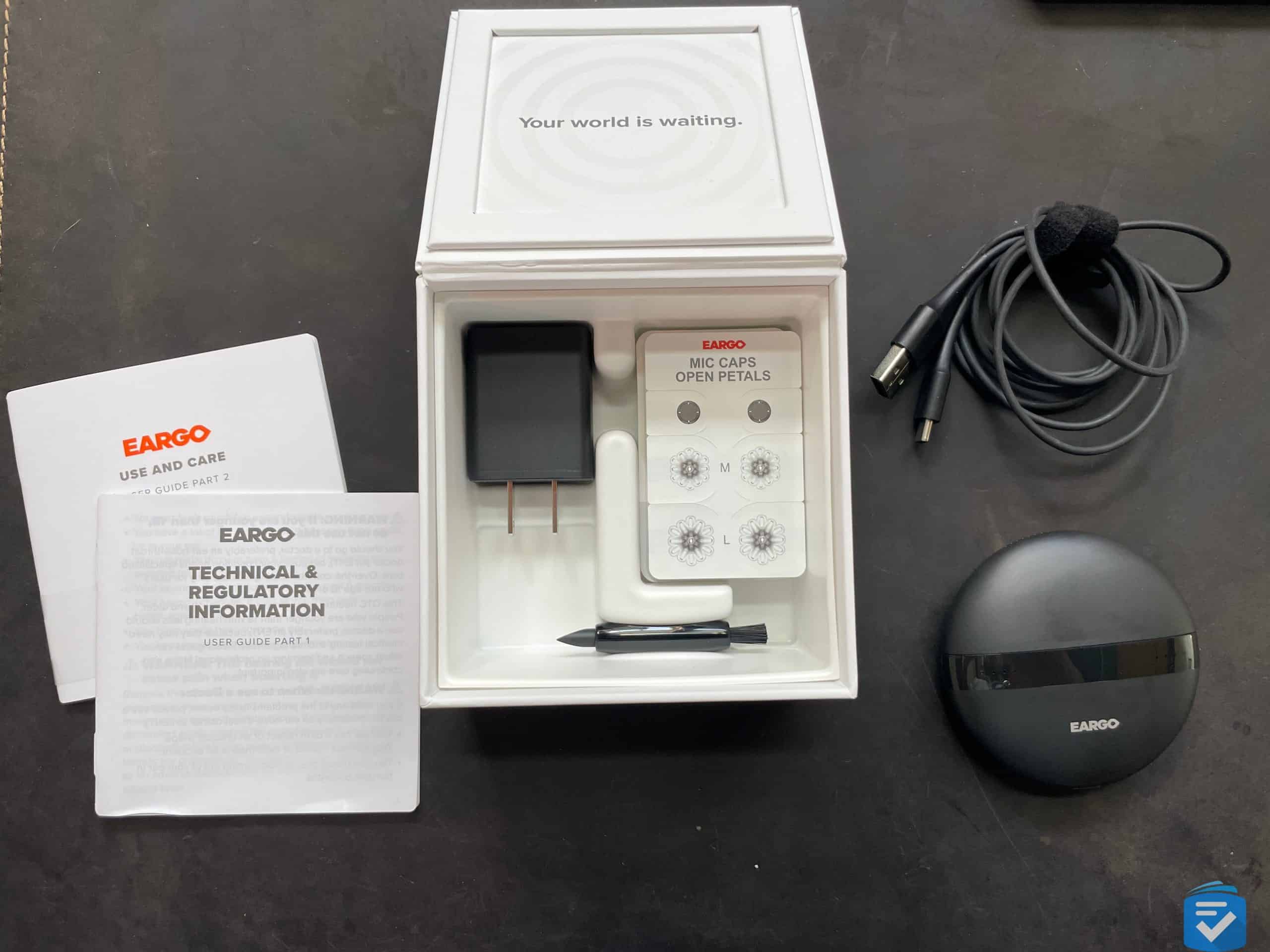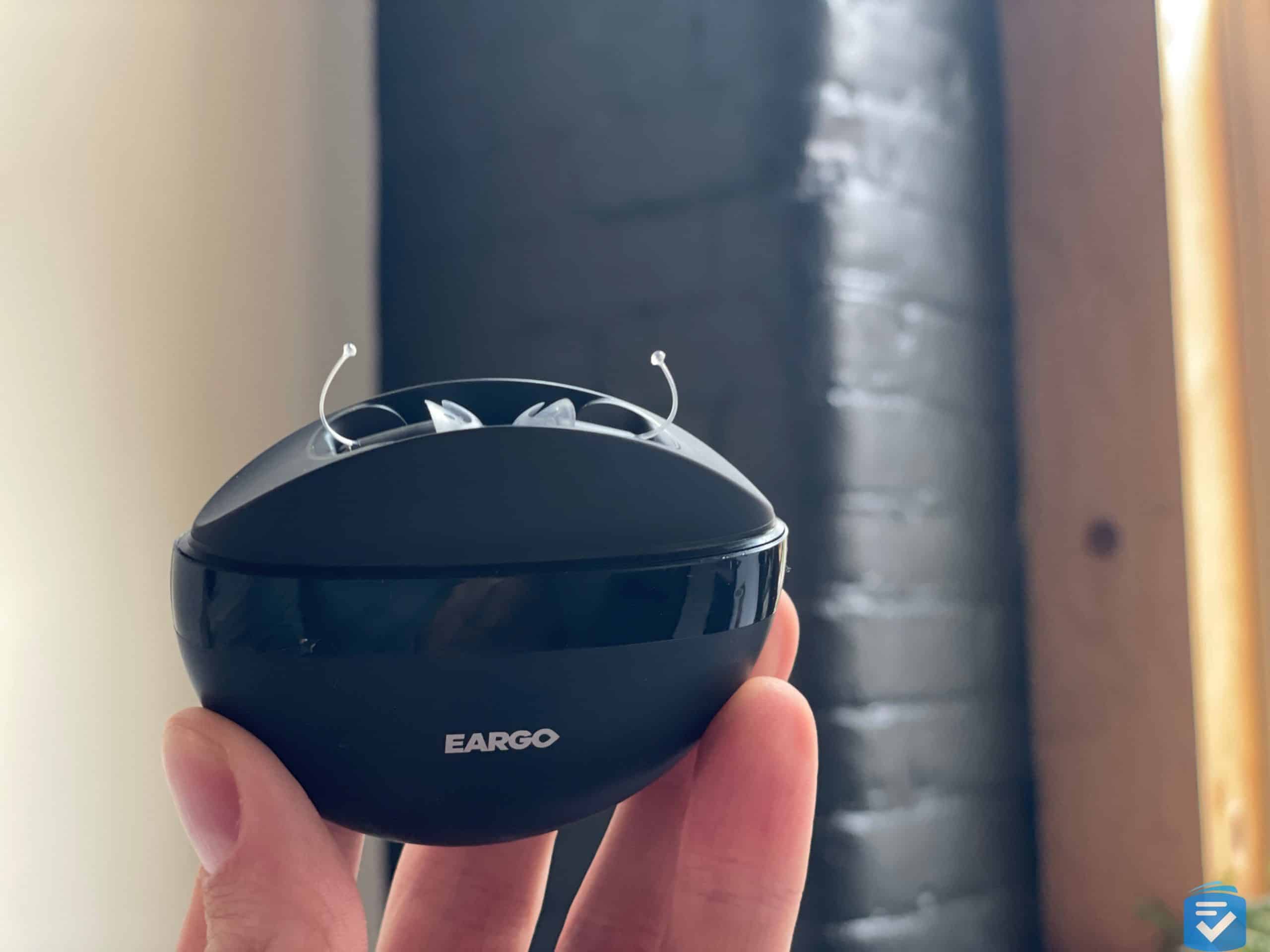ReSound vs. Eargo
After extensive testing of both brands, we found that ReSound hearing aids generally offer more advanced technology, and Eargo’s biggest strength is the small size of their devices. As an OTC hearing aid brand, Eargo also offers devices that generally cost less, while ReSound, which requires professional fittings, will be able to offer a higher level of customer care.
Overall, both brands offer some of the better hearing aids we’ve tested. The right one for you will ultimately depend on your budget, technological proficiency, and specific hearing loss.
Key Findings
- ReSound hearing aids offer superior performance for those with moderate-to-profound hearing loss. They feature advanced directional microphone technology and spatial sense features that help process sounds more naturally.
- Eargo hearing aids are incredibly small, making them nearly invisible when worn.
- ReSound hearing aids are sold through audiologists and require professional fitting, whereas Eargo devices can be purchased directly online.
FYI: While ReSound and Eargo each have their strengths, both companies’ hearing aids are on the expensive side. To find devices from $297 for a pair, read our guide to this year’s best hearing aids overall.

|

|
|
|---|---|---|
| Editor's Ratings | ||
| Price Range | $2,000-$7,000 per pair | $799-$2,699 per pair |
| Style | Various (BTE, RIC, ITE, CIC) | Completely-in-canal |
| Bluetooth Streaming | Yes (most models) | LINK by Eargo only |
| Battery Type | Rechargeable or disposable | Rechargeable |
| Warranty | Varies by provider (typically 1-4 years) | 1-2 years |
| Trial Period | Varies by provider (typically 30-60 days) | 45 days |
| Remote Support | Available through ReSound Assist | Included |
| App Control | Yes (Smart 3D app) | Yes |
| Purchase Method | Through audiologist | Direct-to-consumer |
| Hearing Loss Range | Mild to profound | Mild to moderate |
| Contact | ||
| Phone Number |
Call for best price:
866-334-3974 |
|
| Website | View Pricing Links to ZipHearing.com | View Packages Links to Eargo |
ReSound Hearing Aids Overview
ReSound is one of the preeminent hearing aid brands worldwide. The company is credited as being the first manufacturer to include direct-to-iPhone streaming in their hearing aids. As communication becomes increasingly dependent upon internet-equipped smart devices, ReSound continues to be at the forefront of wireless technology and direct connectivity.

>> Read More: The Best iPhone Hearing Aids
ReSound offers a range of hearing aid styles and models to address various degrees of hearing loss, from mild to profound. Their newest model, the ReSound Nexia, features Auracast compatibility and an additional microphone inside the ear canal, allowing for more natural replication of sounds. Other popular models include the LiNX Quattro, OMNIA, and ENZO Q (for severe-to-profound hearing loss).
ReSound’s devices feature directional microphones, which lets users hear more than just the noise in front of them and allows them to choose the sounds they wish to hear. Many of ReSound’s devices offer Bluetooth connectivity for streaming audio directly from smartphones, televisions, and other devices.
ReSound hearing aids are only available through licensed hearing health care professionals and require a proper hearing evaluation and professional fitting. This approach ensures that users receive personalized care and adjustments tailored to their specific hearing needs. It also means ReSound devices generally cost more than over-the-counter hearing aids, however.
To learn more about our hands-on experience with their devices, read our full ReSound hearing aids review.
Eargo Hearing Aids Overview

Stylish, small, and available for purchase online, Eargo hearing aids are often compared to the sleekness of Apple products. Appearances aside, Eargo devices have long impressed us with their smartphone features. Users can easily adjust their settings through a companion mobile app that provides convenient control over their hearing experience. Each pair of Eargo hearing aids comes with a portable rechargeable case (similar to Apple’s AirPods charging case), which streamlines the charging process and ensures users always have power when they need it.
Eargo’s current models (Link, SE, and 7) showcase the company’s commitment to improving technology while maintaining their signature discreet design. While most don’t offer Bluetooth streaming (save for the Link), they provide a natural listening experience that focuses on clarity and comfort for everyday conversations and activities. The in-canal placement not only ensures near-invisibility but also uses the ear’s natural anatomy to deliver more natural sound quality.
As an over-the-counter option, Eargo hearing aids can be purchased directly without a visit to an audiologist. This approach makes them more accessible and often more affordable than prescription alternatives. One caveat of all OTC hearing aids is that the FDA only approves them for users with mild-to-moderate hearing loss.
Performance Comparison
In terms of performance, both Eargo and ReSound hearing aids deliver quality sound experiences, but they’re designed for different hearing needs and lifestyles. Additionally, you’ll want to remember that both brands offer several models, each of which has slightly different features.
In quiet home environments, ReSound’s advanced models, such as the Nexia and LiNX Quattro, deliver exceptional clarity and natural sound reproduction for everyday conversations and music listening. Their directional microphone technology and spatial sense features provide a comprehensive soundscape that closely mimics natural hearing. Eargo’s devices, particularly the Eargo 7, create a similar organic listening experience with remarkably natural voice reproduction, considering their small size.
>> Read More: The Best Invisible Hearing Aids
Another Eargo 7 feature we appreciated is their Sound Adjust+ technology. With this feature, the hearing aids automatically adapt to their surroundings, reducing background noise in noisy environments while allowing background sounds to be heard more clearly in quiet settings.
ReSound’s models demonstrated their technical advantage for complex listening environments like restaurants. The Nexia and OMNIA models excel with their Ultra Focus mode and advanced noise reduction, which effectively isolate conversation from background noise. Eargo’s performance in these environments varies by model, with the Eargo 7 performing admirably for an OTC device but showing more difficulty distinguishing and clarifying speech in noisy settings.
In outdoor settings, Eargo’s completely in-canal design proves particularly effective in windy conditions, with minimal wind interference across all models. ReSound’s behind-the-ear models are more susceptible to wind noise, although their advanced models, such as the ENZO Q, feature wind noise reduction technology that helps mitigate this issue.
Battery life varies between the brands. ReSound’s rechargeable models deliver up to three days of use with their charging case. Eargo devices average 16-to-18 hours per charge, although their portable charging case adds convenience for on-the-go power replenishment. ReSound also offers devices with disposable batteries for users who prefer that option.

>> Read More: The Best Rechargeable Hearing Aids
For users with more severe hearing loss, ReSound is a clear winner, as Eargo’s devices are designed for mild-to-moderate hearing loss only. ReSound’s ENZO Q model, in particular, is designed to address severe-to-profound hearing loss with powerful sound amplification and is even compatible with cochlear implants from Cochlear.
Features Comparison
ReSound and Eargo both incorporate advanced audio processing technologies, but they diverge considerably in their features.
ReSound delivers an extensive array of technological innovations across their product lineup. The Nexia model features All Access Directionality combined with an Ultra Focus setting that enhances speech recognition in complex audio environments. Every ReSound device incorporates wireless connectivity for direct audio transmission from compatible devices, including smartphones and tablets. The Smart 3D application gives wearers granular control over their hearing experience, enabling customized audio profiles for different locations and the ability to receive remote fine-tuning from hearing professionals through their ReSound Assist service.
In contrast, Eargo prioritizes minimalism and intuitive controls. Their proprietary Sound Match system enables personalized configuration through mobile devices. At the same time, their adaptive technology (Sound Adjust+ on the Eargo 7 and Sound Adjust on the Eargo SE) monitors surrounding audio conditions and automatically transitions between settings. Though wireless streaming functionality is limited within Eargo’s product range, their newest offering — the Eargo Link — does incorporate this capability.
The supplementary device ecosystem for ReSound is significantly more extensive, encompassing the TV Streamer 2 for television audio, the Phone Clip+ for mobile communications, the Multi Mic for challenging listening situations, and physical remote controllers for those preferring tactile adjustments. These supplementary tools substantially expand functionality in various acoustic scenarios. By contrast, Eargo offers little in terms of comparable accessories.
For individuals experiencing tinnitus symptoms — more than half of people with hearing loss — both manufacturers provide potential options for relief. ReSound incorporates specific tinnitus management functionality in select models, while Eargo’s engineering approach and audio enhancement capabilities might help alleviate tinnitus discomfort for many users.
Pricing Comparison
Unless you plan to buy the most basic ReSound model, Eargo hearing aids are almost always more affordable.
>> Read More: The Best Affordable Hearing Aids
Eargo costs range from $799 per pair for the Eargo Link to $2,699 per pair for the Eargo 7. These prices include the devices, charging case, and their standard support package with remote assistance.
ReSound hearing aids must be purchased through an audiologist or other hearing health care professional. Because of this, their pricing is not standardized and can vary significantly depending on the provider, location, included services, and the specific hearing aid model.
That said, ReSound hearing aids range from approximately $2,000 to $7,000 per pair, with their most advanced models, such as the Nexi, at the higher end of this range. This pricing typically includes professional fitting, initial adjustments, and some follow-up care, though policies vary by provider.
It’s important to note that while ReSound’s per-ear pricing may appear higher at first glance, the comparison isn’t straightforward. ReSound’s pricing often includes professional services and more advanced technology for a broader range of hearing loss, while Eargo’s devices are specifically designed for mild-to-moderate hearing loss only.
Warranties Comparison
While Eargo has a standard warranty of one-to-two years, ReSound’s warranty terms vary depending on the hearing health care provider through which you purchase their devices.
Typically, ReSound hearing aids come with a manufacturer’s warranty of one-to-four years, covering defects in materials and workmanship. Some providers may offer extended warranty options for an additional cost. Because ReSound hearing aids are fitted and sold through audiologists, warranty service typically requires in-person visits to your provider, who then handles the warranty claim process with ReSound.
Eargo offers more standardized warranty coverage. The Eargo Link and SE come with a one-year warranty, and the Eargo 7 comes with a two-year warranty. This warranty covers repairs at no extra charge and one-time loss coverage for the Eargo SE ($295 per device) and Eargo 7 ($395 per device). No loss coverage is offered for the Eargo Link.
ReSound warranties generally do not cover the loss of the hearing aids themselves, but, once again, this varies by provider. Some hearing health care providers offer loss and damage coverage for an additional fee.
Customer Support Comparison
The primary difference in customer support between Eargo and ReSound is essentially remote versus in-person assistance.
ReSound’s customer support will be through the hearing health care professional who fits your devices. This approach provides personalized, often face-to-face, support from a professional who understands your specific hearing profile. Most audiologists offer lifetime support for the devices they sell, including regular in-person appointments for cleaning, maintenance, and programming adjustments. This hands-on professional support is particularly valuable for users with complex hearing needs or those less comfortable with technology.
ReSound also offers the ReSound Assist feature through their Smart 3D app. This feature allows users to receive remote adjustments from their hearing care provider without an in-person visit. It combines the benefits of professional support with the convenience of remote assistance.
Eargo offers free lifetime remote support. Their hearing professionals are available via phone, video chat, or email to help with setup and adjustments. This remote support is included at no additional cost for the lifetime of your devices, regardless of which model you purchase. For users comfortable with technology, Eargo’s combination of smartphone app and remote support provides a convenient way to manage hearing aids without office visits. However, it lacks the hands-on assistance that some users, particularly those with dexterity issues, might prefer.
Additionally, some research has found that self-fitting OTC hearing aids with remote support have resulted in similar outcomes as hearing aids fitted through an audiologist. With this in mind, we think the ideal support model largely depends on your comfort with technology, preference for in-person assistance, and specific hearing needs.
Bottom Line
Both ReSound and Eargo offer quality hearing aid solutions, but they serve different user needs:
Choose ReSound if you:
- Have moderate-to-profound hearing loss that requires comprehensive treatment.
- Want the most advanced streaming and connectivity technology.
- Prefer in-person professional fitting and ongoing audiologist support.
- Need features for severe hearing loss or specific conditions such as single-sided deafness.
- Have insurance or VA benefits that cover prescription hearing aids.
Choose Eargo if you:
- Have mild-to-moderate hearing loss.
- Want hearing aids that aren’t noticeable.
- Prefer a direct-to-consumer purchase without audiologist visits.
- Are comfortable with managing your own hearing aids.
- Value an all-in-one package with included remote support.
Frequently Asked Questions
-
Does Eargo or ReSound offer better value for money?
With all-inclusive pricing, Eargo typically offers better value for mild-to-moderate hearing loss. For more severe hearing loss or complex hearing needs, ReSound’s prescription approach may provide better long-term value despite the higher initial cost.
-
Can I stream music with both brands?
All ReSound models offer Bluetooth streaming capabilities for direct audio from smartphones and other devices, while only the Eargo Link supports audio streaming among Eargo’s models.
-
Which brand is better for first-time hearing aid users?
For first-time users with mild-to-moderate hearing loss who value discretion and simplicity, Eargo provides an accessible entry point. For those with more significant hearing loss or who prefer professional guidance, ReSound’s audiologist-supported approach might be better suited to your needs.
-
Do I need to see an audiologist to purchase either brand?
ReSound hearing aids require a visit to a hearing health care professional and are only available through licensed providers. Eargo hearing aids can be purchased directly online without a prescription or audiologist visit.
-
Which brand offers better options for severe hearing loss?
ReSound clearly offers superior options for severe-to-profound hearing loss, particularly with their ENZO Q model, which is even compatible with cochlear implants. Eargo devices are specifically designed for mild-to-moderate hearing loss only and are not suitable for severe cases.
